- Home
- Rosamunde Pilcher
The Carousel Page 8
The Carousel Read online
Page 8
Daniel did not at once respond to this impassioned appeal. I knew that he was waiting for me to intervene, perhaps make some excuse for him, but I stayed selfishly silent. Through the windscreen wipers’ fan of clear glass I saw the road ahead, awash with muddy water; the oak trees, black against the sky, lashed with rain.
“Please,” Charlotte persisted.
He said, “I might.”
But she stuck to her guns. “Does that mean yes or no?”
“Well, all right…” He turned his head to grin at her. “Yes.”
“Oh, good.” She actually clapped her hands. “What shall I bring, Prue? Shall I bring my gum boots?”
“Perhaps you’d better. And a proper raincoat in case it’s wet.”
“But we’ll have a picnic, won’t we, even if it’s raining?”
“Yes, we’ll have a picnic. We’ll find somewhere to eat it. What do you like? Ham sandwiches?”
“Yes. And Coke.”
“I don’t think we’ve got any Coke.”
“I think Granny’s got some. And if she hasn’t I’ll go and buy some. They sell it in the village shop.”
We had reached the gates of White Lodge. I drove through them and up the short drive, and the house, as before, waited for us, curtained in the rain, its face closed and blank, giving nothing away. We drew up at the foot of the steps, and Daniel got out in order to let Charlotte emerge from the backseat. He stood looking down at her. She was holding the picture she had drawn. Phoebe had taken it down from the mantelpiece and given it to Charlotte as we were on the point of leaving.
“Don’t forget this,” she had said, and added hopefully, “Perhaps you’d like to give it to your grandmother.”
But now Charlotte held it out to Daniel. “Would you like to keep it?” she asked him shyly.
“I’d like to very much. But isn’t it for your grandmother?”
“Not really. She won’t want it.”
“In that case, I’ll take it.” He did so. “Thank you. I shall treasure it.”
“I’ll see you tomorrow then. Good-bye. Goodbye, Prue, and thank you for bringing me home.”
We watched her climb the steps to the front door. As Daniel got back into the car beside me, the door opened. A wedge of yellow light shone out into the murk, and we saw Mrs. Tolliver standing there. She waved—perhaps to say thank you, perhaps to say good-bye—and then drew Charlotte indoors.
Chapter 5
WE SET OFF FOR PORTHKERRIS. It was only a short journey, but it was made that evening, by Daniel and me, in total silence. Sometimes silences between two people are comfortable things; sometimes they speak more loudly than words. On other occasions they become strained and tense, and this was one of them. I wanted to break the constraint, to start some trivial conversation, but in the face of such noncooperation I could think of no words for the tall, quiet stranger who sat beside me. His hand, still holding Charlotte’s present, lay against his knee. His head was turned away from me. He stared out at the drenched, grey-green fields, the stony walls, the rain. There seemed to be nothing to say.
We reached the gates of the hotel at last, turned up the driveway, parked with all the expensive cars. On that gloomy evening even the opulent Castle Hotel had an abandoned appearance, like a sinking liner, with its few lighted windows reflected in a sea of puddles.
I turned off the engine and waited for Daniel to get out of the car. Now there was only the sound of the rain drumming on the roof and the sough of wind blown up from the sea far below us. Listening, I heard the distant breakers crashing on the shore. Daniel turned his head and looked at me. “Will you come in?”
I couldn’t think why he had even bothered to ask me. “No. You have to get in touch with Lewis Falcon. And I should get back…”
He said urgently, “Please. I want to talk to you.”
“What about?”
“We can have a drink.”
“Daniel…”
“Please, Prue.”
I switched off the headlights and we got out of the car. Once more the revolving doors injected us into that warm, scented, carpeted, overheated interior. Today, perhaps because of the inclement weather, there were more people about. They sat grouped around tea tables, read their newspapers, chatted over knitting. The air was thick with late-afternoon boredom. Daniel headed for the bar, but it was too early and it had not opened yet.
He stopped before the shuttered door and said, “Bloody hell,” so loudly that one or two pairs of eyes were raised to observe us. I felt embarrassed. I knew how we looked, untidy and incongruous; Daniel in his worn jeans and the sweater of dark rough wool; myself in an old navy blue duffle coat that had seen better days, and with my hair windblown and uncombed.
I wanted to go away. “I don’t want a drink, anyway.”
“I do. Come on, we’ll go up to my room.”
And without waiting for my response to this suggestion, he set off up the wide staircase, his long legs taking the steps three at a time. Because there didn’t seem to be anything else to do, I followed him, aware of the interest that our behaviour was arousing. I knew that we would be suspected of the very worst, but so concerned was I by Daniel’s behaviour, so apprehensive for myself, that I didn’t care anyway.
His room was on the first floor, at the end of a long, wide passage. He took the key from his pocket and went in, turning on the lights, and I followed him and saw that he had been given one of the best rooms in the hotel, facing out over the small nine-hole golf course. The greens and fairways of this golf course sloped to a little wood, and so high on the hill were we that the sea’s horizon lay above the topmost branches of these trees. This evening the horizon was not visible, but the window of Daniel’s room stood open, and the wind poured in upon us and sent the long curtains flapping like badly set sails.
He shut the door and went to close the window. The curtains ceased their frantic dance. I looked at the large, comfortably furnished room, with its unexpected features that made it feel more like a bedroom in some well-loved country house than an impersonal hotel. There was a fireplace, and over this a pretty mirror, framed in rose-colour glass. Chintz-covered armchairs were drawn up before the fireplace, and the same chintz skirted the dressing table. A television set stood on a low table, and beside this was a small refrigerator. There were even flowers on the mantelpiece and a round basket of fresh fruit by the wide double bed.
When he had shut the window, Daniel went to switch on the electric fire. Sham logs instantly flickered. He was still holding Charlotte’s picture. Now he placed it carefully in the middle of the mantelpiece. In the mirror I could see his quiet reflected face.
I watched him and waited.
He said, “She’s my child.”
Beyond his reflection, I could see my own, my face a pale blur, my hands deep in the pockets of my coat; the whole image distorted by some flaw in the glass so that I appeared ghostly, like a person drowned.
It was suddenly very hard to speak. I said, “Charlotte,” and the word came out as a whisper.
“Yes, Charlotte.” He turned from the fireplace, and across the room our eyes met. “She’s my child.”
“But why are you saying this?”
He said again, “She’s my child.”
“Oh, Daniel.”
“You see, all those years ago, I had a love affair with her mother. I wasn’t in love with Annabelle, she was married to another man, she already had a child. Everything was against us. But still, contrary to any sort of reason, it happened. And Charlotte is the outcome of a long, hot summer of what must have been total madness.”
I said, “I know about it. I mean, I know about you and Annabelle Tolliver.”
“Phoebe told you.”
“Yes.”
“I thought she might tell you. In fact, I was pretty sure that she would.”
We stared at each other. My mind, like a panicky rabbit, scuttled to and fro, getting nowhere. I tried to remember the words that Phoebe had used. I think it
was Annabelle who fancied Daniel. Daniel was a very quiet person. It was a total nonevent anyway.
I said. “But I thought … I mean … I didn’t realise…”
He rescued me from my delicate floundering. “You thought we’d just had a little walk out. I always hoped that that was what Phoebe and Chips thought too. But you see, it wasn’t nearly as innocent as that.”
“You’re … you’re sure she’s your child?”
“I knew the moment I saw her this afternoon, sitting there on her camp stool, at the end of the sea wall. In the cold and the rain, trying to finish her picture. Prue, you’ve gone as white as a sheet. I think we’d better both have a drink.”
I watched him go to open the refrigerator. He took out glasses and ice and soda water and a bottle of whisky and set these on the top of the cabinet.
“Daniel, I don’t drink whisky.”
“I haven’t anything else.” He unscrewed the top of the bottle.
I said, “She doesn’t even look like you.”
“She doesn’t look like Annabelle, either. But I have a photograph of my mother when she was just about that age. Nine or ten. Charlotte is my mother all over again.”
“Did you know that Annabelle was having your baby?”
“She said she was.”
“Wasn’t that enough?”
“As things turned out, no.”
“I don’t understand.”
He shut the refrigerator door and stood leaning against it, a tumbler in either hand. “Prue, take off your coat. It makes you look impermanent. Besides, it’s probably damp. You mustn’t catch a cold.”
I thought this the most irrelevant observation, but I did as he said, unbuttoning the coat and taking it off and laying it over the back of a chair. He held out my drink and I went to take it from him. The glass was icily cold.
I said again, “I don’t understand, Daniel.”
“You can’t understand unless you understand about Annabelle.” He frowned. “Did you never meet her? When you were staying with Phoebe?”
“No, our paths never crossed. I suppose because she used to come down in the summer, and I was usually in Northumberland then, with my father.”
“That would explain it.”
“Were you in love with her?” I sounded cool, as if it were of no importance.
“No, I wasn’t in love with her. Come to think of it, I didn’t even like her very much. But there was something … amazing about Annabelle that rendered every other emotion meaningless. I was twenty and she was twenty-eight. Married and a mother. None of that mattered, either.”
“But didn’t people … talk? Surely Phoebe and Chips…”
“They knew, of course, but they imagined it was just a jolly flirtation. And Annabelle was clever. She played the field. There were always plenty of other men.”
“She must have been very beautiful.” It was hard to keep the wistful note from my voice, but I had never been described as “amazing” and knew that I never would be.
“No, she wasn’t beautiful. But she was very tall and slender and she had a face like a Siamese cat, with a neat little nose and a long upper lip and a smile that was full of secrets. ‘Enigmatic,’ perhaps, the word is. Her eyes were astonishing. Enormous, slanted, a very dark grey.”
“How did you meet her?”
“Phoebe and Chips carted me off to this party. I didn’t want to go, but they said I had to, I’d been invited, and I’d get boring if I did nothing but work. And Annabelle was there. I saw her the moment I walked into the room. She was over on the far side, surrounded by other women’s husbands. I saw that face and my fingers itched to draw her. I suppose I was staring, because she suddenly looked up, straight at me, as though she’d known all along that I was there. And I forgot about drawing her.” He gave a rueful grin and shook his head. “It was like playing a game of rugger and then getting a great kick in the guts.”
“That’s never happened to me.”
I hoped my timid attempt at levity would make him smile, but he didn’t seem to hear it, for now he was pacing up and down the room with his glass in his hand as though it were physically impossible for him to talk and stand still at the same time.
“The next time we met, it was on the beach. I’d got a surfboard, a Malibu, from Australia. A friend had brought it for me from Sydney. There was a north wind that day, and the rollers were pouring in from miles out. I surfed until the tide changed, and when I came in, blue with cold because I couldn’t afford a wet suit, I saw Annabelle sitting up on the dunes, watching me. I had no idea how long she’d been there. She wore a red skirt and her hair was loose and black and blowing in the wind. There wasn’t anyone else on the beach that grey day, and I knew that she was waiting for me. So I climbed up to where she sat, and we talked and smoked her cigarettes, and the rushes all around us were flattened by the gale. I remember thinking that they looked like stroked fur. And later we walked home, and the golf links smelled of wild thyme. And a couple of men, golfers, passed us, and I saw them looking at Annabelle and then at me, and there was envy in their faces. It made me feel good. And that’s the way it always was; going into a pub with her, or sitting beside her in the car, with the roof down and the sun on our faces. We’d stop at traffic lights, and people on the pavements would turn their heads, and stare, and smile.”
“They were probably thinking what a good-looking couple you made.”
“More likely asking themselves what a sensational creature like Annabelle was doing with a callow, gangling boy.”
“How long did this go on for?”
“Two months. Three months. It was a very hot summer. She said it was too hot to take her little boy back to London. So she stayed at Penmarron. She was always there.”
“Did she talk about her husband?”
“Leslie Collis? Not much. Rumour had it that she’d married him for his money, and she certainly didn’t talk of him with much obvious affection. That didn’t bother me. I didn’t want to know about him. I didn’t want to think about him. I didn’t want to feel guilty. If you’re really determined, it’s quite possible to stuff an uneasy conscience out of sight. I’d never realised that I had that ability. It made things much easier.”
“Perhaps, at twenty, that’s the way you’re meant to live life.”
He smiled. “You sound old and wise. Like Phoebe.”
“I wish I were.”
He was still pacing, a caged tiger, up and down the charming, pretty room. He said, “It was about this time of the year, the middle of September. Only it wasn’t raining like it is now. They went on and on, the sunshine and the warmth. So that I was taken unawares when Annabelle suddenly announced that she was going back to London. We were on the beach again. We’d been swimming. It was a flood tide, one late afternoon. The tide had come in over the warm sand, and the sea was the colour of jade and very warm. We were sitting having a cigarette, and she told me about going back to London, and I waited for utter desolation, and then realised that I wasn’t desolate. In a funny way, I was relieved. I wanted it to stop now, while we were still having fun. I didn’t want it to get stale. Besides, I knew that I had to get back to work. Painting has always been the most important thing in my life, and it had started tugging at me. I wanted to turn my back on everything else and concentrate on my painting, drown myself in it. My year with Chips was just about over. I wanted to travel, to learn. I planned to go to America.
“I started to say something trivial, but Annabelle interrupted me. It was then that she told me she was having a baby. She said, ‘It’s your child, Daniel.’
“You know, when I was young, growing up, I used to scare the pants off myself by imagining just such a situation. A girl, pregnant by me. A girl I didn’t want to marry. Paternity suits, furious fathers, shotgun weddings. Nightmarish. And now it had happened, only it wasn’t happening that way. She went on talking, and it gradually sank into my paralysed brain that she wanted nothing of me. She didn’t want me to act as correspondent
for a divorce; didn’t want me to elope; didn’t want me to marry her. She didn’t want money.
“I felt there had to be a catch in it somewhere. Finally, when she stopped talking, I said, ‘What about your husband?’ and Annabelle laughed and said that he wouldn’t ask any questions. I told her I couldn’t believe this; no man would accept another man’s child. But Annabelle said that Leslie Collis would, to save his own face and his pride; he hated more than anything else in the world to be made to look foolish. He minded what his colleagues thought of him, what people said about him. He’d built up for himself this hard-headed image, and he would let nothing destroy it. And then she looked at the expression on my face and she laughed again, and she said, ‘Don’t worry, Daniel, he won’t come gunning for you.’
“I said, ‘But it’s my baby,’ and she threw her cigarette away and pushed her hair out of her face and said, ‘Oh, don’t bother about the baby. It’ll have a good home,’ and she made it sound as though she were talking about a dog.”
He was still now, the restless pacing stopped. He stood in the middle of the room, looking down into his glass. There was still some whisky left in the bottom, and with a quick movement of hand and head, he tipped the last of it down his throat. I hoped that he would not pour himself another. He seemed to me, in this frame of mind, a man happy to drink himself into oblivion. But he went and put the empty glass back on top of the refrigerator and then, noticing that it was now dark, moved to the window and drew the heavy curtains, shutting away the dismal night outside.
He turned to face me. “You’re not saying anything.”
“I can’t think of anything intelligent to say.”
“You’re shocked.”
“That’s a ludicrous word to use. I’m in no position to be shocked. I’m in no position to take up any sort of attitude. But for your sake, I’m sorry it happened.”
“I haven’t told you everything yet. Do you want to hear the rest?”
“If you want me to hear.”
“I think I do. I … I haven’t talked like this for years. I’m not sure if I could stop now, even if I wanted to.”

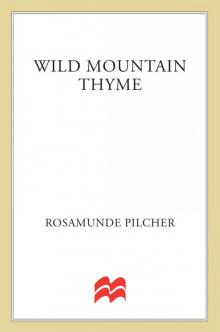 Wild Mountain Thyme
Wild Mountain Thyme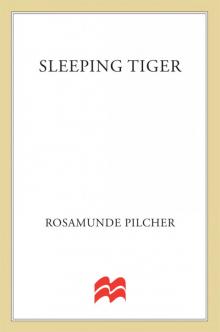 Sleeping Tiger
Sleeping Tiger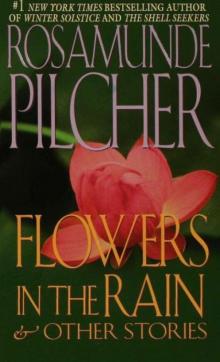 Flowers in the Rain & Other Stories
Flowers in the Rain & Other Stories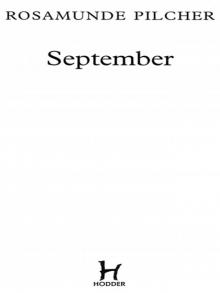 September
September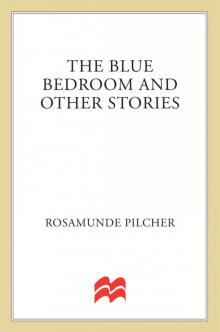 The Blue Bedroom: & Other Stories
The Blue Bedroom: & Other Stories The Carousel
The Carousel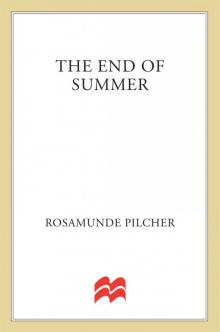 The End of Summer
The End of Summer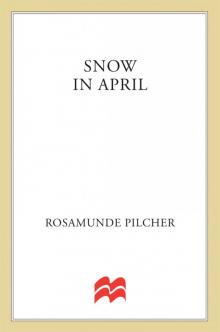 Snow in April
Snow in April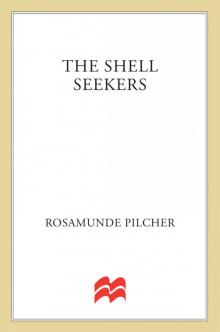 The Shell Seekers
The Shell Seekers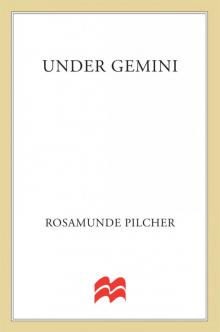 Under Gemini
Under Gemini The Empty House
The Empty House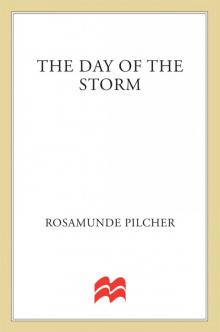 The Day of the Storm
The Day of the Storm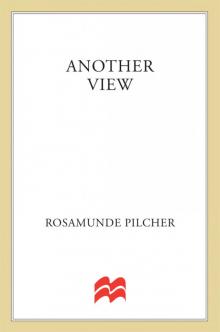 Another View
Another View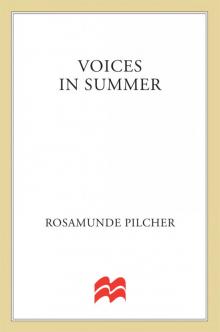 Voices in the Summer
Voices in the Summer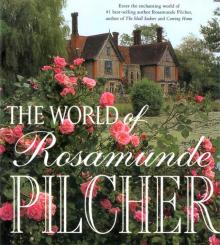 The World of Rosamunde Pilcher
The World of Rosamunde Pilcher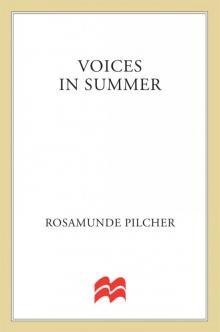 Voices In Summer
Voices In Summer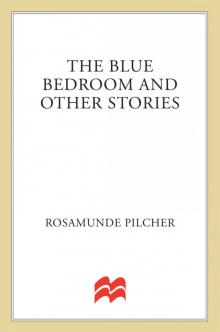 Blue Bedroom and Other Stories
Blue Bedroom and Other Stories